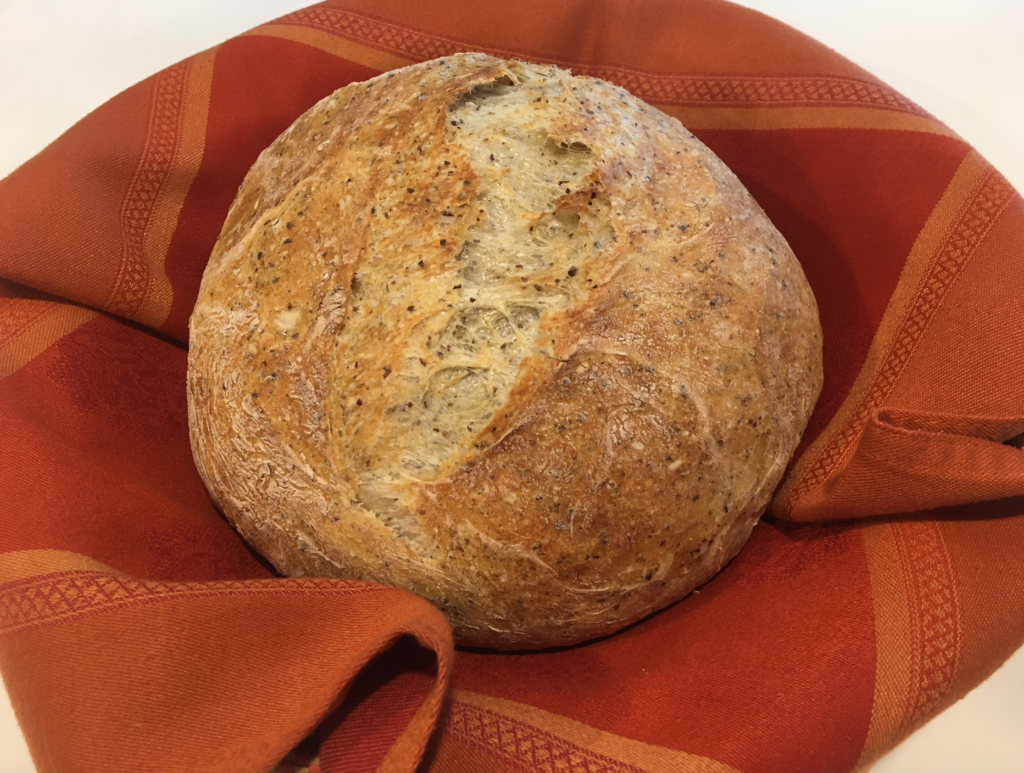
Stewarding our Daily Bread By Jon Lewis

Give us this day our daily bread.
This tiny verse about our daily bread is tucked into the very middle of the Lord’s Prayer. It has been a great text passage for sermons on God’s faithful providence. But have you ever stopped to think how much this verse also teaches us about being a faithful steward?
During this past year, my wife and I have set out to learn what we can about the craft of bread-baking. Even though we’ve been making bread off and on during our forty-four years of marriage, I am amazed how much more there was to learn about what goes into to baking a really great loaf of bread. On top of that, I’ve also been impressed how much making and eating bread has taught me about two key stewardship principles: sufficiency and renewal.
SUFFICIENCY
The principle of sufficiency has to do with knowing when enough is enough. It speaks directly to how a faithful steward must make wise use of the master’s resources, of not being wasteful, of learning how contentment and satisfaction must mitigate our natural tendencies toward selfish greed. Nowhere in Scripture is this principle illustrated better than when God provided mana in the desert for the Children of Israel (Exodus 16.) He provided a food source for them in adequate abundance but then instructed to only gather what was sufficient for each day. Anything gathered beyond what was needed for that day would spoil.
Bread baking also illustrates this well. Although there are a lot of extra ingredients you can add to bread dough, a basic loaf of bread only needs four things: flour, water, yeast, and salt. But these ingredients must be measured out in sufficient quantities. Our contemporary cultural thinking that “more is better” certainly does not apply here because adding too much of any one of these four things will ruin the loaf of bread. This is especially true of yeast. One might think that the more yeast one uses, the more the bread dough will rise. Not true! Too much yeast will produce, among other things, too much ethanol by-product during the proofing process causing the bread to taste “yeasty” and somewhat sour. But in the proper sufficient quantity, yeast will produce just the right amount of carbon dioxide gas to cause the dough to rise, and just enough of ethanol (which boils off during baking) to give the bread a great flavor.
RENEWAL
The Lord’s Prayer request in Matthew is not just for bread, but for daily bread. This means the plea to our Father is for a renewal of his provision on a daily basis. If He gives us just what is sufficient for yesterday, that means we will need it resupplied again today. Once again, God’s provision of mana in the desert illustrated this as the Israelites discovered a fresh allowance of their food need every morning of each new day. Similarly, with our bread-baking, my wife and I find that a home-made loaf is great for two, three, maybe four days max. But the freshness of bread, which is at its peak when you take it out of the oven, will begin to decrease from that moment on. The inside will lose its moisture and become stiff and chewy while the crust will lose its crunchiness absorbing some of that moisture. The result is bread starting to taste stale. That is why we now make a small loaf that is sufficient for two or three days and then renew the process with another fresh loaf after that.
STEWARDSHIP
It doesn’t take much effort to think of how these two stewardship principles have all sorts of applications in our daily lives. Disciplining ourselves in accepting what is sufficient can apply to the temptation of overbuying at a Costco sale and turning down that unnecessary fourth piece of pizza as well as rejecting the super-sized french-fry offer at MacDonald’s. And a commitment to renewal can relate to everything from regular oil changes for our car or lawnmower blade reconditioning as it can to refreshing relationships by spending more quality time spent with our spouse, kids, or neighbors. How about a little discussion tonight around the dinner table to brainstorm other applications you could be more intentional about with your family?
If nothing else, I hope from now on every time you bite into a slice of bread, it will be a great reminder of how you can be an ever more faithful steward by practicing the principles of sufficiency and renewal.
(Note: In case you’re curious about how to make the super-simple, no-knead home-made bread described and pictured above, feel free to contact me at jonlewis23@gmail.com. – Jon.)
####
Jon Lewis is a Senior Associate for Partnership Advancement with OC International and focuses on encouraging global Christian leaders towards greater ministry effectiveness. With over 40-years of experience, he also served as a MAF mission pilot in Africa and CEO of Partners International.
Learn to Become a Faithful Steward

For over 45 years, the Christian Leadership Alliance community has put its years of experience in the “business” of ministry to work for its members. Come and experience it first hand at The Outcomes Conference 2021.
Discover a community and an event where a leader like you belongs!
Come and Join Us!

What is Christian Leadership Alliance?
Christian Leadership Alliance equips and unites leaders to transform the world for Christ. We are the leaders of Christ-centered organizations who are dedicated to faithful stewardship for greater kingdom impact.
Sign up for FREE blog updates.
Upcoming Events
Check back later!


